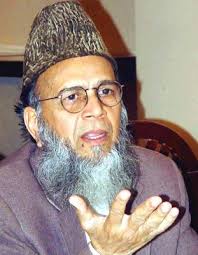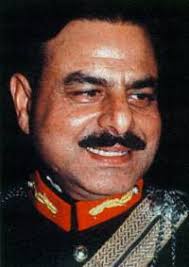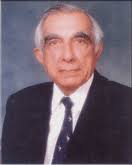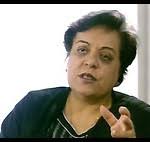







Ayesha Siddiqa
Friday, 13 Nov, 2009 (Dawn)
A few days ago I came across a letter to the editor in Dawn in which the writer had protested against the use of the word ‘Taliban’ to describe the brutal killers currently terrorising the nation.
In the writer’s view, such people should be termed ‘zaliman’. I thought I would advise the writer to watch more television and read newspapers to get rid of his anger against the Taliban.
Perhaps the writer would have benefited tremendously by watching a programme aired recently on a TV channel in which three distinguished maulanas — including Jamaat-i-Islami leader Fareed Paracha — argued that the Taliban were being needlessly maligned since there was no evidence available to prove that the attacks were being carried out by the Tehrik-i-Taliban Pakistan.
Furthermore, it was said that the TTP’s claiming responsibility for terrorist attacks inside Pakistan did not add up to much since anyone could make those calls just to malign the organisation of non-state militants.
The above interview came a couple of days after the army claimed to have found evidence of India’s involvement in the conflict in Waziristan. Islamabad should take the evidence to the International Court of Justice since it does not hope to get a fair hearing from anyone else in the world, certainly not the US. Since India and America are viewed as being ‘hand-in-glove’, Pakistan cannot afford to share the above information with Washington as New Delhi did in the case of the Mumbai attacks.
The evidence of India’s involvement should be sufficient to put the aforementioned letter writer’s mind at rest. Now we no longer need to search for internal sources of violence.
Since the responsibility of the conflict in the region is now the responsibility of the US followed by India, we need not even look at the fact that Pakistan witnessed about 45 terrorist attacks before 9/11 which many in this country view as the sole cause of strife and bloodshed in the entire region. We can no longer argue that 9/11 just expedited the process of bringing to the surface all those elements or networks that later caused violence in the region.
I would go further and apprise the writer of another crucial fact that technically, there are no home-grown terrorists in Pakistan since there has never been any conviction in a major case of terrorism. The significant names that are associated with extremist terrorist activities such as Haq Nawaz Jhangvi, Riaz Basra and Malik Ishaq of the Sipah-i-Sahaba Pakistan (SSP)/Lashkar-i-Jhangvi (LJ), Qari Saifullah Akhtar of Harkat-ul-Jihad-ul-Islami (HuJI) or Masood Azhar of Jaish-i-Mohammad (JM) and many others are foreign concoctions.
The country’s legal system is such that the onus of proving an individual or organisation’s responsibility in an act of terror lies on the state. So, if the police are unable to bring concrete evidence before the court it is difficult to convict those accused of terrorism by the law-enforcers. Moreover, the legal procedures take so long that the prosecution (being the state) is unable to hold on to witnesses. They either die, are killed or are too scared to give evidence against organisations and individuals with a particular reputation.
Technically, it is but fair to let people go if nothing can be proven against them. This was essentially the position which Pervez Musharraf took for not pursuing action against those who were swapped for the hostages of Indian Airlines flight IC 184 which was hijacked to Kandahar in 1999. Why arrest someone if even the enemy had failed to convict the people after keeping them in jail for so many years?
Hence, it is not surprising that there are hardly any convictions. In a couple of cases where this has happened, as in the case of American journalist Daniel Pearl’s murder, the death sentence has not been carried out.
We now know that Khaled Sheikh Mohammad of Al Qaeda and not Omar Saeed Sheikh committed the murder. Probably, it was in appreciation of Sheikh’s innocence that his jailers in Hyderabad allowed him access to several SIMs and mobile phones that he then used for very naughty activities, which we will not report here as acts of potential terrorism.
One might just wonder about the killings of Shias in the country, which have been going on since the mid-1980s when the SSP was reportedly established to fight the Tehrik-i-Nifaz-i-Fiqh-i-Jafria by the state. We hardly notice that last year there were systematic killings of Shias in Dera Ismail Khan and before that of Shia doctors in Karachi. The killing of Shias in Balochistan by the Taliban also goes unnoticed by the media and the authorities.
Surely one cannot discuss Balochistan at all where there is much more serious evidence of India’s involvement. The maulanas might argue again that sectarian violence in Balochistan is an Indian/American conspiracy.
The person who wrote the letter might decide to respond to this piece and might argue that the behaviour pattern of the Pakistani establishment and the bulk of the people remains the same. We accused the East Pakistanis of being Indian agents and said the civil war was caused by Hindu teachers in collusion with the Indian state. Any signs of India’s involvement very naturally mar our ability to look at other possibilities or threats.
In East Pakistan’s case, for instance, the internal crisis had nothing to do with the unfair treatment of the Bengalis by the West Pakistani civil and military establishment. The only truth about that era was that the Mukti Bahini was trained by Indian intelligence.
We in Pakistan are coming close to a point where we can comfortably forget that we have elements within that want to take over (perhaps not physically) the state in pursuance of their pan-Islamic agenda. The war being fought by Pakistan due to international pressure is what has caused all the violence.
I would like to refer to the golden words of Punjab’s Law Minister Rana Sanaullah in response to the allegation of south Punjab turning into a hub of extremism and terrorism.
The minister felt there was no training taking place in the region and if people were getting recruited to fight in Afghanistan or other places, how could the government stop this. After all, we live in a free country.
Under the circumstances, my only advice to the writer of the letter is that if he begins to feel unsafe vis-à-vis the presence of the ‘zaliman’ within, he/she should build additional bunkers outside the house.
The writer is an independent strategic and political analyst.
ayesha.ibd@gmail.com
Editor's Choice
--------------------------------------------------------------------------------------------------------------------------
Featured Post
--------------------------------------------------------------------------------------------------------------------------
"Let us build Pakistan" has moved.
30 November 2009
All archives and posts have been transferred to the new location, which is: http://criticalppp.com
We encourage you to visit our new site. Please don't leave your comments here because this site is obsolete. You may also like to update your RSS feeds or Google Friend Connect (Follow the Blog) to the new location. Thank you.
We encourage you to visit our new site. Please don't leave your comments here because this site is obsolete. You may also like to update your RSS feeds or Google Friend Connect (Follow the Blog) to the new location. Thank you.
--------------------------------------------------------------------------------------------------------------------------
Friday, 13 November 2009
Don't malign Taliban. It's foreign agents who are responsible for terrorism in the guise of Taliban.
Subscribe to:
Post Comments (Atom)





















No comments:
Post a Comment
1. You are very welcome to comment, more so if you do not agree with the opinion expressed through this post.
2. If you wish to hide your identity, post with a pseudonym but don't select the 'anonymous' option.
3. Copying the text of your comment may save you the trouble of re-writing if there is an error in posting.